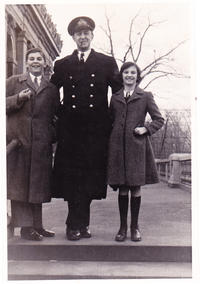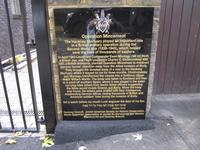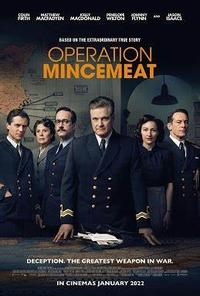(Re)creating family lives on stage and screen: Operation Mincemeat
It’s a strange feeling, watching someone you don’t really know, but have seen many times, portraying someone you know really well but at the same time, who is completely not them. This is what we’ve just experienced recently in two very different formats.

Ewen Montagu with his children
My grandfather Ewen Montagu was in Naval Intelligence in the Second World War and, as one of his many double-cross operations, constructed the scheme that came to be known as ‘The Man Who Never Was’. Times journalist Ben Macintyre’s book about it has recently been made into a film ‘Operation Mincemeat’ which came out in cinemas in April this year.
The purpose of the scheme was to convince the Nazis that the invasion of Italy in 1943 would take place via Sardinia rather than the actual route of Sicily, by using a dead man’s body, dressed as a Royal Marine and carrying convincing but fake documents and set adrift off the coast of Spain to make it look as if his plane had crashed. Spain, officially neutral but unofficially allied with the Nazis, was an effective conduit to Berlin, and the plan worked, saving thousands of lives as the Germans swallowed the deception and transferred troops and Panzer divisions to Sardinia, leaving Sicily a far easier target than it otherwise would have been. It makes a great story, and the film has a great cast – Colin Firth plays my grandfather, and the cast includes Matthew MacFadyen, Jason Isaacs, Penelope Wilton, Kelly MacDonald, Mark Gatiss, James Fleet and Simon Russell Beale and Paul Ritter. If you didn’t know anything about the people involved, it’s a great film as well.
But if you do know them, it’s hard to take the Hollywoodisation of their lives - I don’t know whether Grandpa would have been more annoyed by the way he, a seasoned and trusted intelligence officer, is presented in the film as a dilettante lawyer, dropped in for this one operation, or by the way his marriage is presented as cold and loveless, with him packing his wife and children off to America shortly before the operation to get them out of the way, in order to create a storyline about him falling for the young colleague who supplied the photo that was used as part of the ‘wallet litter’ which went towards creating a convincing persona for the Marines officer that the corpse became. In fact, my grandparents had decided in the summer of 1940, during the height of the London Blitz (rather than as late as 1943) that it would be safer for my father and aunt for them to be evacuated to America, and better for the children to have at least their mother with them, rather than being sent away alone. Later in 1940, Grandpa, who had started the war stationed in Hull, was personally selected for transfer to the Admiralty by the Director of Naval Intelligence, and was in charge of naval counter-espionage for the rest of the war. Far from not being able to speak, let alone write to each other, we still have all the many letters our grandparents wrote to each other revealing their misery at being apart and how much they missed each other. Granny addresses her letters to ‘Darlingest’ and Grandpa, going one better, sends his letters to ‘Darlingestest’. At the point when he was in Hull on active service, and she and the children were about to cross the Atlantic with all the concomitant dangers of U-boat and torpedo attacks on convoys, he wrote to her: ‘I want to say that I love you and to thank you for 17 wonderful years’; she replied ‘How lucky I’ve been to have had 17 years of fun and happiness and how few other people have had so much’.

This memorial plaque to Operation Mincemeat has been recently unveiled at The Hackney Mortuary. It is interesting to reflect that Ewen Montagu was in fact both a British Jew and a British aristocrat. (Photo: IMW/Martin Sugarman)

Although I really didn’t enjoy the many misrepresentations of the film, another recent interpretation of the story was surprisingly enjoyable – Operation Mincemeat, the musical, currently showing at the Riverside Studios in Hammersmith. What an unlikely subject for a musical, you might think, but I have to say I loved it. Grandpa was a great believer in not taking himself too seriously, and although on the surface, this is a thoroughly unexpected take on the story (the five cast members each play several characters; the casting is gender-blind and Grandpa is played by a woman), but the lyrics and dialogue are always witty and on occasions moving, and the show conveys the sheer enjoyment Grandpa and his team had in coming up with creative and unlikely ways to fool the Germans and feed them untrue but sufficiently believable digressions from reality to undermine their war effort and ultimately lead to their defeat. The musical also takes a much cleverer (and more likely) twist on the fact that Grandpa’s brother Ivor was a member of the Communist Party and also (probably not very effectively) spied for the Soviet Union. The film implies that Grandpa might have leaked secrets to Ivor; I think that too many people today, accustomed to constant leaks from government and elsewhere, have no concept of the levels of discretion that operated during wartime and indeed after. The musical on the other hand, picks up on Ivor’s film career, and the fact that The Man Who Never Was became a successful film in the 50s as a much more likely outlet for Grandpa’s creative mind after the war.
At the end of the day, upsetting though it is to see my grandparents’ marriage traduced and Grandpa’s undoubted expertise rather belittled, it’s probably worse for people like the members of the Royal Family watching ‘The Crown’. And it is rather cool to be able to say that Colin Firth is playing your grandfather….Go and see both the film and the musical if you can, and let me know what you think!



